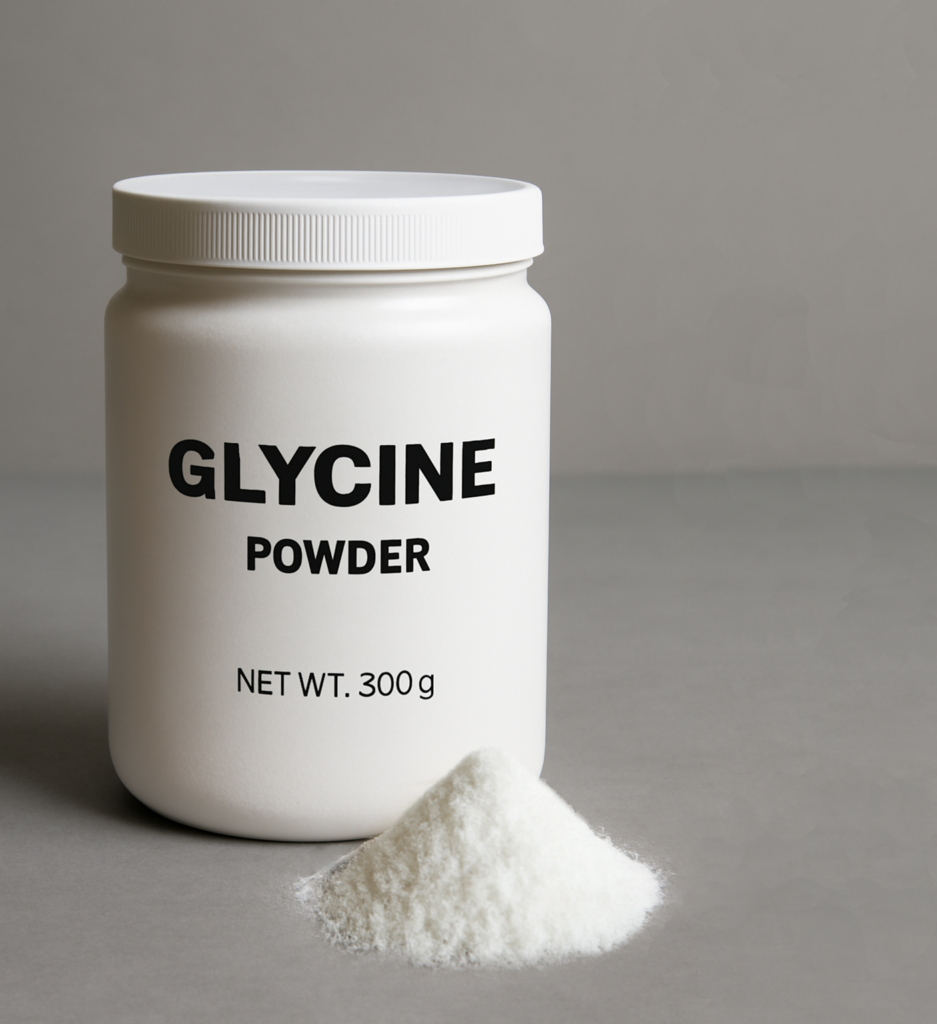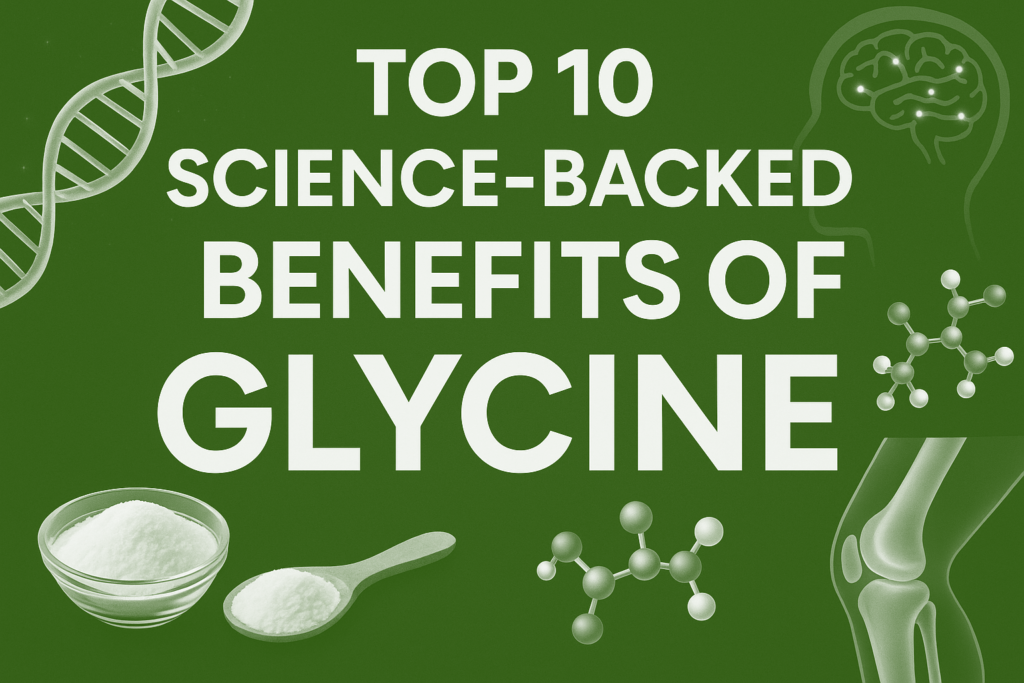
Curious about glycine benefits? This small but mighty amino acid supports everything from better sleep and glowing skin to gut, brain, and liver health. While your body can produce glycine on its own, many of us can benefit from additional intake, especially during times of stress, inflammation, or healing.
In my practice, I’ve seen glycine help clients fall asleep more easily, enhance their mental clarity, and support gut and liver health. Let’s dive into the top glycine benefits, how to increase your intake naturally, and when supplementation might be most helpful.
What Is Glycine?
Glycine is the simplest amino acid, yet its roles in the body are anything but simple. It’s technically “non-essential,” meaning your body can make it, but research suggests we often don’t produce enough to meet our needs, especially under stress or during recovery (Wang et al., 2023).
Glycine is a critical component of:
- Collagen – vital for healthy skin, joints, bones, and the gut lining
- Glutathione – the body’s master antioxidant
- Neurotransmitters – calming the nervous system and improving sleep quality
- Detoxification – helping your body process and eliminate toxins
You may stir glycine powder into tea or coffee for a hint of sweetness, but its benefits go far beyond flavor.

1. Promotes Restful Sleep
Glycine supports deeper, more restorative sleep by lowering core body temperature and calming the nervous system. A 3-gram dose before bed has been shown to improve sleep quality and morning alertness without next-day grogginess (Yamadera et al., 2007).
2. Boosts Cognitive Health
Glycine enhances brain performance by supporting NMDA receptor activity, which is essential for memory, learning, and attention. It may also improve mood, especially in sleep-deprived individuals (Bannai et al., 2012).
3. Supports Youthful Skin
Glycine is a key player in collagen synthesis, making up about one-third of collagen’s structure. Collagen keeps skin firm and elastic, reducing wrinkles and supporting healthy hair and nails (Proksch et al., 2014). More glycine in your diet could mean a natural glow-up.
4. Reduces Inflammation
Glycine has anti-inflammatory superpowers, inhibiting pro-inflammatory cytokines and potentially easing conditions like arthritis or inflammatory bowel disease. A 2023 study highlighted its role in reducing systemic inflammation, which may lower the risk of chronic diseases (Wang et al., 2023).
5. Protects Your Liver
Glycine protects against alcohol-induced liver damage and supports detoxification pathways, potentially reducing the risk of fatty liver disease (Senthilkumar et al., 2004).
6. Enhances Muscle Growth and Recovery
Athletes, take note: glycine supports muscle repair by aiding protein synthesis and reducing muscle breakdown. It’s also been shown to decrease exercise-induced soreness, helping you recover faster (Zhong et al., 2003).
7. Strengthens Gut Health
Glycine fortifies the gut lining, potentially preventing and healing leaky gut syndrome. It supports mucus production in the intestinal wall, protecting against inflammation and improving nutrient absorption (Wang et al., 2013).
8. Powers Antioxidant Production
Glycine is a key ingredient in glutathione, your body’s master antioxidant. Glutathione neutralizes free radicals, protecting cells from oxidative stress. Low glycine levels can limit glutathione production, so keeping levels up is crucial (Sekhar et al., 2011).
9. Supports Blood Sugar and Metabolism
Glycine may help regulate blood sugar by improving insulin sensitivity and reducing glucose production in the liver. This can stabilize energy levels and lower the risk of type 2 diabetes (Gannon et al., 2002).
10. Supports Joint and Bone Health
Thanks to its role in collagen production, glycine strengthens connective tissues like tendons and ligaments, supporting joint health. It may also promote bone density, making it a great ally for aging gracefully (Ding et al., 2016).
Where to Find Glycine in Food
To experience the full range of glycine benefits, it helps to include glycine-rich foods in your daily meals.
Here are top food sources rich in glycine:
- Bone Broth: Rich in collagen and glycine. Sip it or use it in cooking.
- Gelatin: Found in homemade jellies or collagen desserts.
- Meat and Poultry: Especially skin and connective tissues.
- Fish: Like sardines or salmon (especially with skin).
- Legumes: Beans provide a plant-based source.
- Seaweed: A lesser-known, glycine-rich plant option.
Pro Tips:
1. Slow-cooked meats or stews with bones and connective tissues are a delicious way to boost glycine intake naturally.
2. When choosing meat, poultry, fish, bones, or gelatin, prioritize high-quality sources: pasture-raised, grass-fed and grass-finished meats, organic pasture-raised poultry, and wild-caught, cold-water fish. These not only support your health but are also more nutrient-dense and free from harmful additives.
Potential Side Effects of Glycine
- Digestive Upset: High doses may cause nausea or diarrhea.
- Sleepiness: May cause drowsiness in some people during the day.
- Drug Interactions: May reduce effectiveness of medications like clozapine.
- Allergic Reactions: Rare but possible.
- Pregnancy/Breastfeeding: Use with caution unless approved by your provider.
Most studies use 3–5 grams daily with minimal issues. Start low and consult your healthcare provider.
Why I Love Glycine
Whether it’s helping you catch better Z’s, keeping your skin glowing, or supporting your gut, glycine is a low-key superstar. I keep glycine powder on hand to add to tea, coffee, or sparkling water with lemon.
Glycine Supplements
Click here to access my favorite Glycine supplements curated through Fullscript.
I recommend Fullscript because they offer practitioner-grade supplements that are third-party tested for quality, purity, and potency—so you can feel confident in what you’re putting into your body.
References
- Bannai, M., et al. (2012). The effects of glycine on subjective daytime performance…
- Gannon, M. C., et al. (2002). The metabolic response to ingested glycine…
- Proksch, E., et al. (2014). Oral supplementation of specific collagen peptides…
- Sekhar, R. V., et al. (2011). Deficient synthesis of glutathione underlies oxidative stress…
- Senthilkumar, R., et al. (2004). Glycine modulates hepatic lipid metabolism…
- Wang, W., et al. (2013). Glycine stimulates protein synthesis and inhibits oxidative stress…
- Wang, Y., et al. (2023). Glycine: A potential therapeutic agent for inflammation…
- Yamadera, W., et al. (2007). Glycine ingestion improves subjective sleep quality…
- Zhong, Z., et al. (2003). Glycine supplementation reduces skeletal muscle ubiquitin expression…
+ show Comments
- Hide Comments
add a comment